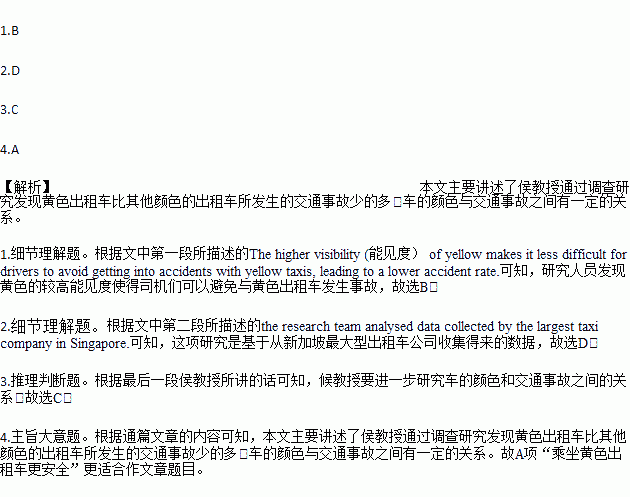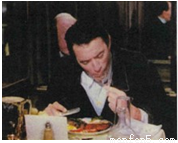题目内容
A recent study led by researchers from the National University of Singapore (NUS) has found a clear link between the color of a taxi and its accident rate. An analysis of 36 months of detailed taxi, driver and accident data from two fleets of yellow and blue taxis in Singapore suggested that yellow taxis have fewer accidents than blue taxis. The higher visibility (能见度) of yellow makes it less difficult for drivers to avoid getting into accidents with yellow taxis, leading to a lower accident rate.
The study was led by Prof Ho. To test whether there was a relationship between the color of a taxi and the number of accidents the taxi had, the research team analysed data collected by the largest taxi company in Singapore. The researchers found that yellow taxis have about 6.1 fewer accidents per 1,000 taxis per month.
They also studied the economic effect of changing the color of the entire fleet of taxis to yellow. The Singapore taxi company involved in the study owns about 16,700 taxis in a ratio (比例) of one yellow to three blue taxis. If a commercial decision is made to switch from blue to yellow taxis, 76.6 fewer accidents will occur per month or 917 fewer accidents per year.
Assuming an average repair cost of $1,000 per car and a downtime of six days, the color of all taxis to yellow could produce an annual saving of $2 million.
“We are eager to continue to validate(证实) the findings of our study by looking at the use of yellow in other types of public transport, such as school buses. For example, we hope to compare the accident rates of yellow school buses against those of other colors to find out if yellow is indeed a safer color for school buses. Besides, we’re also interested to look at private-hire vehicles and do a comparison of the accident rates of vehicles that are of different colors, ”explained Prof Ho.
1.Why do yellow taxis result in fewer accidents?
A. Because yellow signals a warning of danger.
B. Because yellow can be seen more easily.
C. Because drivers tend to be more careful in yellow taxis.
D. Because people act more quickly in yellow surroundings.
2.What’s Prof Ho’s study based on?
A. Physical risks taxi passengers experience.
B. The economic effect of changing taxi color.
C. Personal reports from taxi drivers worldwide.
D. Data from Singapore's largest taxi company.
3.What do Prof Ho’s words in the last paragraph suggest?
A. School buses should be painted yellow.
B. Their findings are worth popularizing.
C. Their study will be furthered.
D. Yellow should be widely used in public transport.
4.What can be the best title for the text?
A. Safer to ride in yellow taxis
B. Caution: yellow taxis ahead
C. Why are yellow Taxis preferred?
D. How can colors help prevent accidents?
| A. | considerate | B. | sensitive | C. | reliable | D. | passive |


